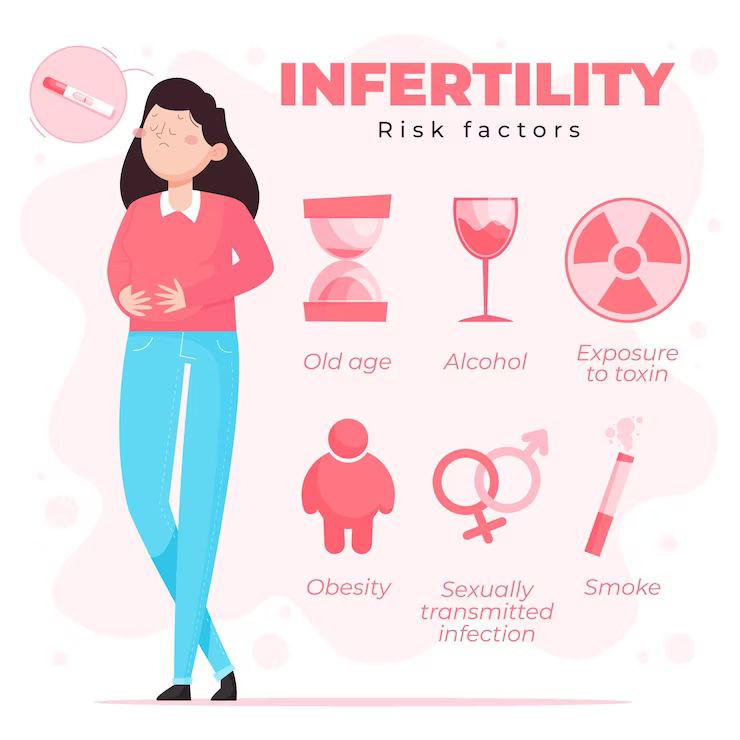What Are The Causes of Infertility in Men & Women
What is infertility?
Infertility is when you face challenges in getting or staying pregnant. It can affect anyone, regardless of gender or age. Diagnosis typically occurs after a year of unsuccessful attempts or multiple miscarriages. Treatment options exist, and many individuals successfully overcome infertility to have healthy pregnancies and children. Both partners are equally likely to contribute to fertility issues, so testing often involves both if pregnancy difficulties arise.
What causes infertility?
Infertility can have many different reasons. If you’re having trouble getting pregnant, it’s a good idea to visit a fertility specialist. They can help find out what’s causing your fertility issues and suggest the most suitable treatments. Occasionally, doctors can’t pinpoint the exact cause of infertility, which is called unexplained infertility. While this can be quite frustrating, there are usually treatment options available to explore.

Causes of infertility in women
Infertility in women can be attributed to various factors, including:
1. Ovulation Disorders: Irregular or absent ovulation can hinder conception. Conditions like polycystic ovary syndrome (PCOS) and hypothalamic dysfunction can disrupt the normal ovulation process.
2. Structural Issues: Abnormalities or blockages in the fallopian tubes, cervix, or uterus can prevent the sperm from meeting the egg. These can result from conditions like endometriosis or fibroids.
3. Hormonal Imbalances: Fluctuations in hormone levels, such as thyroid disorders or hyperprolactinemia, can disrupt the menstrual cycle and impact fertility.
4. Age: Fertility declines with age, especially after the age of 35, as both the quantity and quality of eggs diminish.
5. Pelvic Inflammatory Disease (PID): Infections in the reproductive organs, such as PID, can lead to scarring and damage that impairs fertility.
6. Premature Ovarian Insufficiency (POI): POI is a condition in which the ovaries stop functioning normally before the age of 40, resulting in reduced egg production.
7. Lifestyle Factors: Smoking, excessive alcohol consumption, drug use, and being significantly underweight or overweight can affect fertility.
8. Genetic Factors: Certain genetic conditions can impact a woman’s ability to conceive, and genetic testing may be necessary.
9. Cancer and Its Treatments: Cancer and the treatments like chemotherapy and radiation can harm ovarian function and overall fertility.
10. Stress: Chronic stress can disrupt hormonal balance, potentially affecting the menstrual cycle and fertility.
It’s important to consult a professional infertility specialist if experiencing fertility issues, as they can help identify the specific cause and recommend appropriate treatments or interventions.
Causes of infertility in men
Infertility in men can be attributed to several factors, including:
1. Low Sperm Count: A low sperm count, known as oligospermia, can significantly reduce the chances of fertilization.
2. Poor Sperm Quality: Even if sperm count is normal, poor sperm quality, characterized by abnormal shape or motility, can impede fertilization.
3. Varicocele: Swelling of the veins that drain the testicles, known as a varicocele, can increase testicular temperature, impacting sperm production and quality.
4. Hormonal Imbalances: Conditions like hypogonadism can disrupt normal hormone levels necessary for sperm production.
5. Blockages: Physical blockages in the reproductive tract, such as the epididymis or ejaculatory ducts, can obstruct the release of sperm.
6. Infections: Infections in the reproductive system can cause inflammation and scarring, affecting sperm production or delivery.
7. Genetic Factors: Genetic abnormalities may lead to infertility, and genetic testing may be necessary to identify these issues.
8. Retrograde Ejaculation: In this condition, semen flows backward into the bladder instead of exiting the body, reducing sperm availability for fertilization.
9. Lifestyle Factors: Unhealthy habits like smoking, excessive alcohol consumption, drug use, and obesity can negatively impact sperm health.
10. Exposure to Toxins: Occupational or environmental exposure to toxins, such as pesticides or chemicals, can harm sperm production.
11. Radiation and Chemotherapy: Cancer treatments like radiation and chemotherapy can affect sperm production and quality.
12. Stress: Chronic stress can impact hormone levels, potentially reducing sperm production and fertility.
It’s essential for men experiencing fertility issues to consult a professional infertility specialist who can help identify the specific cause and recommend appropriate treatments or interventions.
Conclusion:
Infertility is a shared journey that can affect anyone. It’s crucial to consult a fertility specialist for personalized guidance and potential treatments. Even when the cause remains unknown, there are options to explore. Remember, it’s not a solo challenge; both partners play a role in fertility. With the right support and medical assistance, many individuals and couples can achieve the dream of parenthood despite the obstacles they face.


I’m not that much of a online reader to be honest but your blogs really nice, keep it up! I’ll go ahead and bookmark your site to come back later Cheers